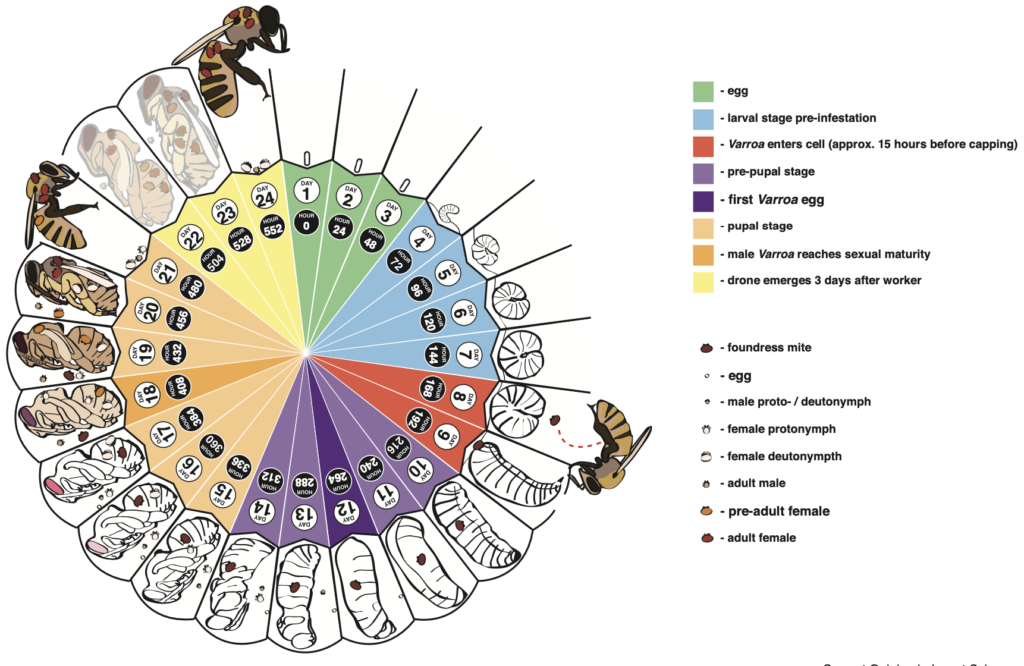African and Africanized bees tend to have greater natural resilience to Varroa. One mechanism associated with this resistance is that these bees have a shorter development time (19-20 days versus 21 days for European subspecies).
A mite requires approximately 240 hours (10 days) to produce one mature female. So less time means fewer daughters. Research has found that even a one hour reduction in the capped period results in a reduction in Varroa population growth of 8.6%. Selecting for a shorter capped brood period was originally viewed as a possibility for developing Varroa resistance.

Reproductive life cycle of Varroa mites and honey bees. A mated female mite enters the brood cell prior to it being capped. Several days later the mite lays a male egg, followed by a female egg approximately every 30 hours. Workers emerge on day 21 and drones on day 24 in European subspecies. Any immature mites won’t survive. From Evans & Cook 2018.
The average capped brood development time of a colony is determined by photographing or inspecting frames at regular periods from the time prior to cell capping to after the brood have emerged and comparing the photos. An infrared sensor can also be used. Colonies with short average post-capping periods are chosen to produce the next generation.
Heritability of development time – the amount of variation that is due to genetics rather than the environment – is highly variable (0.22-0.89), meaning that short brood development time is something that can be selected in some populations. Measurement accuracy is low due to the extended periods between taking photos, resulting in poor estimates of brood period.
Shorter capped brood periods are associated with lower mite infestation, but researchers have found the link with colony survival is variable. Computer modelling of Varroa population dynamics has shown that a reduction of two days in the capped brood period would be required to keep the mite population stable. As a result, breeding for this mechanism has become less favourable.
Acknowledgements:
- Resilient beekeeping in the face of Varroa. AgriFutures Australia. Holmes, Gerdts, Grassl, Mikheyev, Roberts, Remnant, Chapman.
- Varroa – breeding for resistance. AgriFutures Australia and AHBIC. Holmes, Gerdts, Grassl, Mikeyev, Roberts, Remnant, Chapman
- Plan Bee (National Honey Bee Genetic Improvement Program) is supported by funding from the Australian Government Department of Agriculture, Fisheries and Forestry as part of its Rural Research and Development for Profit program. The project is further supported by AgriFutures Australia, the Department of Regional NSW, University of Sydney, University of New England Animal Genetics and Breeding Unit, Better Bees WA Inc, Wheen Bee Foundation, Costa Group, Olam, Beechworth Honey, Monson’s Honey and Pollination, South Pacific Seeds, Australian Queen Bee Breeders Association, Australian Honey Bee Industry Council, and commercial beekeepers.
- Bienefeld (1996) Factors affecting duration of the postcapping period in brood of the honey bee (Apis mellifera carnica). Journal of Apicultural Research 35: 11–17
- Büchler, Kovačić, Buchegger, Puškadija, Hoppe, Brascamp (2020) Evaluation of traits for the selection of Apis mellifera for resistance against Varroa destructor. Insects 11: 618
- Guichard, Dietemann, Neuditschko, Dainat (2020) Advances and perspectives in selecting resistance traits against the parasitic mite Varroa destructor in honey bees. Genetics Selection Evolution 52: 71
- Harbo (1992) Breeding honey bees (Hymenoptera: Apidae) for more rapid development of larvae and pupae. Journal of Economic Entomology 85: 2125–2130
- Martin (1998) A population model for the ectoparasitic mite Varroa jacobsoni in honey bee (Apis melifera) colonies. Ecological Modelling 109: 267–281
- This article was peer-reviewed by Jody Gerdts and Michael Holmes.

